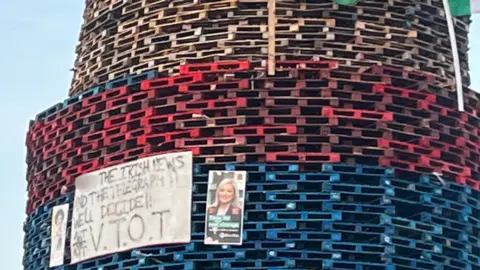 BBC
BBCSecretary of State Hilary Benn has condemned sectarian signs and effigies on Eleventh night bonfires.
Signs, election posters and an effigy appeared on bonfires in parts of NI during what the Northern Ireland Fire and Rescue Service (NIFRS) described as “a relatively quiet” night.
Bonfires are lit on 11 July to kick off the Twelfth of July celebrations. The NIFRS attended 37 bonfire-related incidents overnight, dealing with 25% fewer emergency calls than last year.
A sign apparently threatening SDLP leader Colum Eastwood was placed alongside a hanging effigy on a bonfire in the Rathcoole area of Newtownabbey.
Images of First Minister Michelle O’Neill and SDLP MP Claire Hanna were also placed on a bonfire.
Mr Eastwood said it was saddening that such displays have become “normalised” and happen annually.
It is a “minority” of people, he added, who “feel they have to connect” cultural celebrations “with sectarian abuse and death threats”.
“I think the Twelfth should be able to be celebrated and people should be encouraged to do that. I would always defend people’s right to do that. But it is not OK at the same time to say, you are then allowed to do whatever you want,” he told BBC Radio Foyle’s North West Today programme.
“There are elements of it that are clearly hate-filled,” the Foyle MP added.
Unionist leaders, he said, need “to be much more proactive in trying to move people away from that kind of thing”.
The Police Service of Northern Ireland said it was investigating material placed on the Rathcoole bonfire as a hate crime.
The board was removed following engagement between neighbourhood policing teams and the local community, police added.
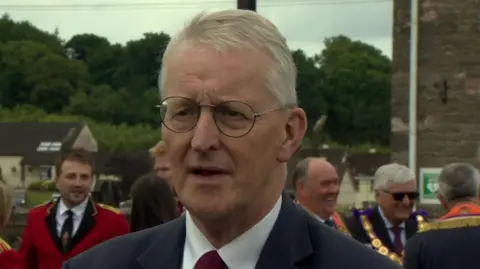
Speaking at the Twelfth parade in Irvinestown, County Fermanagh, Mr Benn condemned the threatening messages and burning of effigies of fellow MPs.
“I really don’t know why people do that. It’s wrong. It’s disrespectful. We should all be able to celebrate our traditions and histories without engaging in that sort of activity,” Mr Benn said.
“And when that does happen then it undermines what is the central purpose of all of this: respect – respect for all.”
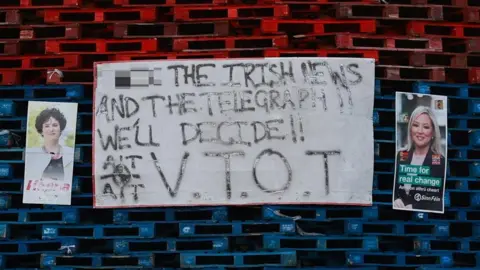 PA Media
PA MediaElection posters depicting Ms O’Neill and Ms Claire Hanna were placed on a bonfire in south Belfast, alongside sectarian threats.
Republic of Ireland and Palestinian flags were also placed on the structure.
Last year, there was condemnation after an image of Ms O’Neill appeared on a bonfire in Dungannon, County Tyrone.
Signs criticising local newspaper titles have also appeared on several bonfires, one of which mentioned SDLP councillor Dónal Lyons, who said “there is a lot more to life than poking people in the eye”.
“This is depressing, not in that it’s about me but that there’s young ones being taught that this is how they can best celebrate their community and traditions,” he wrote on X, formerly Twitter.
In 2023, police received 68 reported incidents, including 21 alleged hate crimes, involving the burning of election posters or effigies, and 47 alleged hate-related incidents, including the burning of flags.
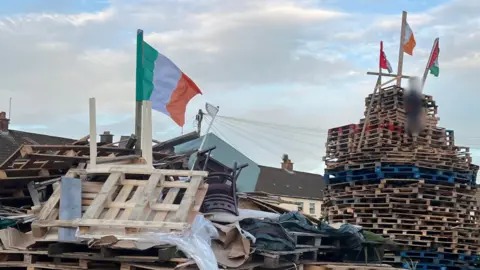
NIFRS Assistant Chief Fire and Rescue Officer Brian Stanfield said it had been “a relatively quiet eleventh night for Northern Ireland Fire and Rescue Service”.
“Between 6pm and 2am, we received 109 emergency 999 calls. This resulted in our firefighters attending 78 operational incidents, 37 of which were bonfire related.
“During this period, the number of emergency calls received was down 25% when compared to 2023.”
On Wednesday evening, hundreds of people gathered to watch a bonfire burn in Moygashel in County Tyrone.
It featured a mock police car on top of the structure.
The bonfire was also adorned with a Republic of Ireland flag and an Irish-language banner reading Saoirse don Phalaistin (Freedom for Palestine).
In 2023, a boat was placed on top of the fire in Moygashel, themed as an anti-Northern Ireland Protocol bonfire.
Why are bonfires lit over the Twelfth?
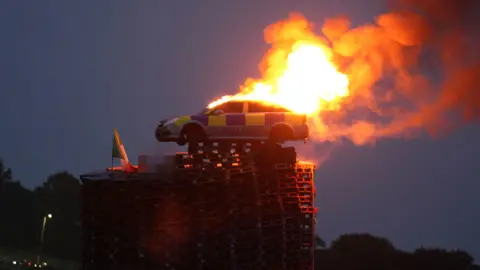 PA
PAHundreds of bonfires are lit every year in unionist communities across Northern Ireland on the eve of the Twelfth of July, the main date in the annual parading season.
The date commemorates the Battle of the Boyne in 1690 when the Protestant King William III – also known as King Billy and William of Orange – defeated Catholic King James II.
Bonfires were lit to welcome – and guide – William.
Historically, a much smaller number of bonfires were lit in mainly nationalist areas on 15 August to mark the Catholic feast of the Assumption, a tradition that was replaced in some places by bonfires to mark the anniversary of the introduction of internment – or detention without trial – on 9 August 1971.
The Craigyhill bonfire in Larne has been the largest in NI in recent years.
In 2022 it reportedly reached about 202ft (62m) in height.

